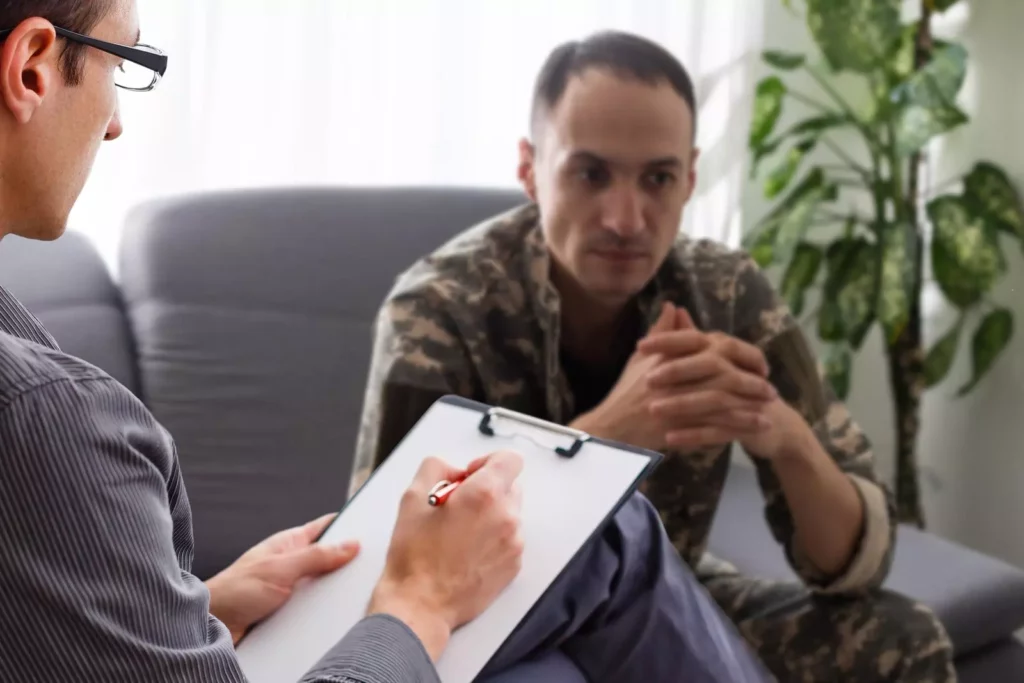Psychotherapy for PTSD
Medication, individual trauma-focused psychotherapy for PTSD such as prolonged exposure, cognitive processing, and eye movements desensitization and reprocessing are effective approaches. A comprehensive treatment plan that leads to greater improvement in PTSD symptoms that are long-lasting. There are few side-effects of psychotherapy although the patient may feel uncomfortable during therapy as they recount traumatic events. Treatment aims to get patients to talk about their ordeal where their maladaptive beliefs can be challenged and modified. People get to confront their issues and deal with guilt, anger, pain, or memory disturbances.
Through finding meaning and purpose that integrates with the trauma, together with relaxation techniques, and other strategies, the patient learns to resolve the internal disturbances so they can move forward in life with a sense of control.

Who and how we help
PTSD psychotherapy for adults
For people suffering from PTSD, psychotherapy and medication are typically part of a treatment plan. Although dealing with traumatic situations can be incredibly challenging, addressing emotions and getting expert support are frequently the only ways to properly recover from PTSD. It’s never too late to get help for PTSD because it can be successfully treated even years after a traumatic incident or event occurred. Before starting PTSD therapy, a thorough evaluation of the patient’s symptoms will be done to make sure the plan of care is appropriate. There are several types of psychotherapy that are successful in assisting the patient in processing past trauma such as cognitive behavior therapy (CBT) and talk therapy.
PTSD psychotherapy for adolescents
In children, PTSD is a serious, frequently persistent, and debilitating mental illness. Untreated PTSD raises the risk of other mental illnesses and suicide. PTSD psychotherapy with a trauma focus is effective in easing symptoms. Any developmental delays are also taken into account throughout therapy, and the course of action is altered accordingly. Individual or family preferences may have an impact on some patients’ therapy selections, which can be explored with the clinician. The young patient may require rapid stabilization in more serious situations before receiving therapy. Parents are advised to keep using the techniques they learned in treatment, especially in response to reminders of the trauma. Patients who have symptom recurrence might benefit from booster sessions.
PTSD psychotherapy treatment steps
Anyone experiencing PTSD symptoms should talk to a mental health professional who is skilled in PTSD psychotherapy. The two major forms of treatment are psychotherapy or medication. A qualified mental health practitioner assists the patient in identifying a treatment strategy that addresses their symptoms and needs based on the psychiatric evaluation and severity of the condition. Some PTSD sufferers can be dealing with ongoing trauma. Treatment in these situations is typically most successful when it tackles both the traumatic situation and the symptoms. Panic disorder, despair, substance usage, and suicidal thoughts can occur in people with PTSD or who have been exposed to trauma. Support from friends and family can also play a crucial role in healing.

The benefits of psychotherapy treatment for PTSD
Psychotherapy helps patients deal with PTSD symptoms like social difficulties, hypervigilance, flashbacks, and persistent nightmares. The Good Health team comprises qualified clinicians, psychiatrists, psychologists, and medical practitioners who offer a range of psychotherapy treatments for PTSD. The objectives of these therapies help patients in recognizing and changing behaviors, thoughts, and emotions that cause distress. Trauma-focused psychotherapy and cognitive behavioral therapy (CBT) are just some of the techniques used for treating PTSD. People may react to psychotherapy differently, just as they react to traumatic situations differently. With the help of an experienced team, patients get a tailored treatment plan. The application of communication, medication and other therapies is designed specifically for a person to help them modify behaviors and improve health.
FAQs
What can PTSD lead to if not treated
The symptoms of PTSD will exacerbate over time if the condition is left untreated. This can result in the onset of other mental health disorders and it can even lead to suicide. The patient’s health is at risk and their capacity to properly function is impaired.
What are the benefits of PTSD psychotherapy?
The best psychotherapy for PTSD includes effectively teaching patients several coping mechanisms to better deal with distressing thoughts and feelings. Group and/or individual counseling sessions, and other forms of psychotherapy along with medication will offer patients constructive results.
What is the best psychotherapy approach for PTSD?
Therapies that are strongly recommended include different forms of psychotherapy interventions such as talk therapy, cognitive processing therapy, psychoanalysis, and/or behavior therapy.
How can family and friends make a difference in the life of someone with PTSD?
While it’s crucial to respect boundaries, offering a loved one who has PTSD your love and support does help them deal with their grief and despair. Interpersonal support from others is the key to PTSD rehabilitation when it comes without judgment or pressure to talk.
How long does it take to achieve results from PTSD psychotherapy?
The length of treatment for PTSD will vary from one individual to another as it is matched to the nature and severity of the disorder. Treatment duration is often revisited during therapy and depends on progress. For mild to moderate symptoms, an average of 20 sessions can offer significant improvements.
What is the success rate of psychotherapy treatment for PTSD?
There is a lot of clinical research available that supports the effectiveness of PTSD psychotherapy. There is a high success rate for those who stick to therapy and poor outcomes for those who drop-out of treatment or don’t seek it all.
Don't hesitate to contact us
Have any questions?
Please complete the form below and we will get right back to you.